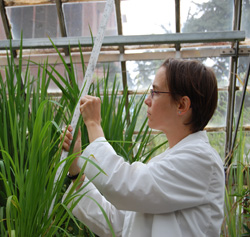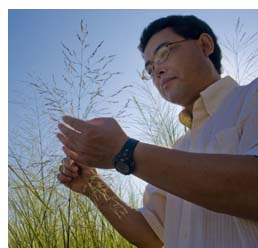
Two EPSCoR Researchers Receive Biofuel Research Funding Award
![]()
USDA and DOE Fund 10 Research Projects to
Accelerate Bioenergy Crop Production and Spur Economic Impact
The U.S. Department of Energy's Office of Science, Office of Biological and Environmental Research, and the U.S. Department of Agriculture (USDA) National Institute of Food and Agriculture’s Agriculture and Food Research Initiative have jointly selected ten projects for awards totaling $12.2 million for biobased-fuel research. It was recently announced that Oklahoma EPSCoR researchers Drs. Laura Bartley and Yanqi Wu are the recipients of one of these awards.
 "Association Mapping of Cell Wall Synthesis Regulatory Genes
"Association Mapping of Cell Wall Synthesis Regulatory Genes
and Cell Wall Quality in Switchgrass"
Goal: Identify natural genetic variation in switchgrass that correlates with lignocellulose-to-biofuel conversion qualities. Most plant dry matter is composed of lignocellulose, and because switchgrass yields high amounts of this material and tolerates drought and other stresses it is an attractive candidate for development into a biofuel crop. This project should enhance understanding of the qualities that critically impact the conversion efficiency of lignocellulose into biofuels.
Pictured: Laura Bartley (top); Yanqi Wu (bottom)
Media Contact: Jennifer Martin, (202) 720-8188
 VERO BEACH, Fla., Aug. 11, 2011 – Agriculture Secretary Tom Vilsack stopped by a waste-to-energy bioprocessing facility under construction in Florida today to announce that the Departments of Agriculture (USDA) and Energy (DOE) have awarded 10 grants totaling $12.2 million to spur research into improving the efficiency and cost-effectiveness of growing biofuel and bioenergy crops. The grants are part of a broader effort by the Obama administration to develop domestic renewable energy and advanced biofuels, providing a more secure future for America’s energy needs and creating new opportunities for the American farming industry.
VERO BEACH, Fla., Aug. 11, 2011 – Agriculture Secretary Tom Vilsack stopped by a waste-to-energy bioprocessing facility under construction in Florida today to announce that the Departments of Agriculture (USDA) and Energy (DOE) have awarded 10 grants totaling $12.2 million to spur research into improving the efficiency and cost-effectiveness of growing biofuel and bioenergy crops. The grants are part of a broader effort by the Obama administration to develop domestic renewable energy and advanced biofuels, providing a more secure future for America’s energy needs and creating new opportunities for the American farming industry.
“USDA is helping our nation develop the next generation of biofuels to grow jobs and generate energy from new, homegrown sources,” said Vilsack. “Combining DOE’s leadership in genome-scale technologies with USDA’s experience in crop improvement will accelerate the efficient production of biofuels.”
“Biofuels, along with other advanced vehicle technologies, hold the potential to help reduce our oil imports while adding new jobs and driving wealth creation in rural America,” said Energy Secretary Steven Chu. “This investment in research will be instrumental in developing the best possible crops to produce biofuels.”
Overall, the USDA and DOE projects are designed to improve special crops to be grown for biofuels—including selected trees and grasses—by increasing their yield, quality and ability to adapt to extreme environments. Researchers will rely on the most advanced techniques of modern genomics to develop breeding and other strategies to improve the crops. The research will be conducted on switchgrass, poplar, Miscanthus and Brachypodium, among other plants.
The potential benefits of this research range from decreasing oil imports to increasing options for American farmers. Because these crops will be optimized to tolerate conditions such as drought and poor soils, they can be grown on marginal lands unsuitable for food crops, thereby avoiding competition with food production. Farmers will have the option to grow bioenergy crops in addition to other existing crop choices.
The 10 projects are located in California, Colorado, Illinois, Florida, Kansas, Missouri, Oklahoma, South Carolina and Virginia. The full list can be found online at: http://genomicscience.energy.gov/research/DOEUSDA/
#page=news.
Vilsack made the announcement at the INEOS New Planet BioEnergy facility in Vero Beach, Fla., which was granted a conditional USDA loan guarantee earlier this year to help build and operate a biorefinery capable of producing 8 million gallons per year of cellulosic ethanol and 6 megawatts of electricity.
Today’s USDA and DOE joint announcement will also benefit Florida by providing grant funding to the University of Florida in Gainesville to improve energy production from cane biomass. The project will produce a range of foundational genetic resources and genetic makers for energy cane breeders to efficiently develop energy cane cultivars with increased biomass production and reduced input requirement.
This is the sixth year of the joint USDA and DOE funding program. DOE’s Office of Science will provide $10.2 million in funding for eight projects, while USDA’s National Institute of Food and Agriculture (NIFA) will award $2 million to fund two projects. Initial funding will support research projects for up to three years.
For more information on the individual projects and the joint DOE-USDA Plant Feedstocks Genomics for Bioenergy research program, visit: http://genomicscience.energy.gov/research/DOEUSDA/
index.shtml.
